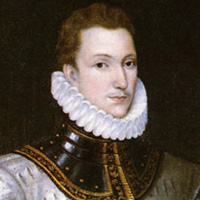An Apology for Poetry by Sir Philip Sidney: Introduction
Philip Sidney in his Apology for Poetry reacts against the attacks made on poetry by the puritan, Stephen Gosson. To, Sidney, poetry is an art of imitation for specific purpose, it is imitated to teach and delight. According to him, poetry is simply a superior means of communication and its value depends on what is communicated.

Sir Philip Sidney (1554-1586)
So, even history when it is described in a lively and passionate expression becomes poetic. He prefers imaginative literature that teaches better than history and philosophy. Literature has the power to reproduce an ideal golden world not just the brazen world.
Stephen Gossen makes charges on poetry which Sidney answers.
The charges are:
1. Poetry is the waste of time.
2. Poetry is mother of lies.
3. It is nurse of abuse.
3. Plato had rightly banished the poets from his ideal world.
Against these charges, Sidney has answered them in the following ways-
Poetry is the source of knowledge and a civilizing force, for Sidney. Gossoon attacks on poetry saying that it corrupts the people and it is the waste of time, but Sidney says that no learning is so good as that which teaches and moves to virtue and that nothing can both teach and amuse so much as poetry does. In essay societies, poetry was the main source of education. He remembers ancient Greek society that respected poets. The poets are always to be looked up. So, poetry is not wasted of time.
To the second charge, Sidney answers that poet does not lie because he never affirms that his fiction is true and can never lie. The poetic truths are ideal and universal. Therefore, poetry cannot be a mother of lies.
Sidney rejects that poetry is the source of abuses. To him, it is people who abuses poetry, not the vice- versa. Abuses are more nursed by philosophy and history than by poetry, by describing battles, bloodshed, violence etc. On the contrary, poetry helps to maintain morality and peace by avoiding such violence and bloodsheds. Moreover it brings light to knowledge.
Sidney views that Plato in his Republic wanted to banish the abuse of poetry not the poets. He himself was not free from poeticality, which we can find in his dialogues. Plato never says that all poets should be banished. He called for banishing only those poets who are inferior and unable to instruct the children.
For Sidney, art is the imitation of nature but it is not slavish imitation as Plato views. Rather it is creative imitation. Nature is dull, incomplete and ugly. It is artists who turn dull nature in to golden color. He employs his creative faculty, imagination and style of presentation to decorate the raw materials of nature. For Sidney, art is a speaking picture having spatiotemporal dimension. For Aristotle human action is more important but for Sidney nature is important.
Artists are to create arts considering the level of readers. The only purpose of art is to teach and delight like the whole tendency of Renaissance. Sidney favors poetic justice that is possible in poet's world where good are rewarded and wicked people are punished.
Plato's philosophy on 'virtue' is worthless at the battlefield but poet teaches men how to behave under all circumstances. Moral philosophy teaches virtues through abstract examples and history teaches virtues through concrete examples but both are defective. Poetry teaches virtue by example as well as by percept (blend of abstract and concrete). The poet creates his own world where he gives only the inspiring things and thus poetry holds its superior position to that of philosophy and history.
In the poet's golden world, heroes are ideally presented and evils are corrupt. Didactic effect of a poem depends up on the poet's power to move. It depends up on the affective quality of poetry. Among the different forms of poetry like lyric, elegy, satire, comedy etc. epic is the best form as it portrays heroic deeds and inspires heroic deeds and inspires people to become courageous and patriotic.
In this way, Sidney defines all the charges against poetry and stands for the sake of universal and timeless quality of poetry making us know why the poets are universal genius.
